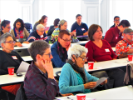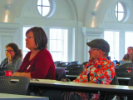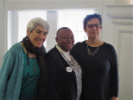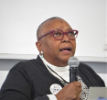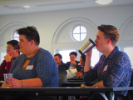Radical history of Women's Studies College at the University at Buffalo
Founded in 1971, the UB Women's Studies College (WSC) is one of the oldest women’s studies programs in the country. This experimental, radical and collectively-run program emerged from the women liberation movement, anti-war activism and a reflection on ways of living of Native American populations.
Elizabeth Lapovsky Kennedy, Bonita Hampton and Sherri Darrow
The Conference “Radical Histories, Radical Futures,” brought together the founders, students and advocates of the UB Women's Studies College (WSC). They sought to build a program collectively run by women, minimizing status and work distinctions among professors, students, and women outside the university.
Members of the program, including Elizabeth Lapovsky Kennedy, Bonita Hampton and Sherri Darrow recalled how the WSC communitybrought together academic teaching and social activism. They were engaged in campaigns for university day-care center, services for women in prisons and projects focusing on women's social, psychological and health care needs.

From left: Savion Mingo, Seth Girod, Adrienne Hill, Christine Varnado
The conference has also brought together community activists and scholars who discussed the problems of doing grassroots local queer and trans history now, and the radical queer subcultures of Buffalo's present and future.
